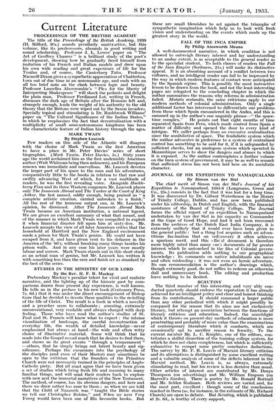SCRUTINY The third number of this interesting and very ably
con- ducted quarterly should endorse the reputation 4 has already achieved for an intelligentpolicy and clear and honest thinking from its contributops. It should command a larger public than any other periodical with which it might possibly be compared for the reason that its aims are not exclusively literary, but attempt an association between the functions of literary criticism and education. Indeed, the searchlight which it throws on present-day methods of education is more penetrating and probably of more value than the examinations of conteinporary literature which it conducts, which are occasionally apt to sacrifice reason to ferocity. To the current number Mr. L. C. Knights, one of the editors, con- tributes a skilful 'dissection of the training college system, for which he does not claim completeness, but which is- sufficiently exhaustive to compel some pretty conclusive deductions. The survey by Mr. F. R. Leavls of Marxist literary criticism and its alternatives is distinguished by some excellent writing and a valuable analysis of some of the defects inherent in the Marxist method. Mr. Leavis is, as always, extremely stimulating to read, but his review is less decisive than usual. Other articles of interest are contributed by Mr. Denys Thompson (on advertising) and Mr. William Empson (on Marvell's Garden). There is poetry by Mr.- Ronald Bottrall and Mr. Selden Rodman. Both reviews are varied, and, for the most part, excellent : though some of the conclusions reached in them (as, for instance, in the estimate of Mr. Richard Church) Eire Open to 'debate. 'But ScnitinY, Which Is iaiblished at 2s. 6d., is worthy of every support. . _ _




































 Previous page
Previous page